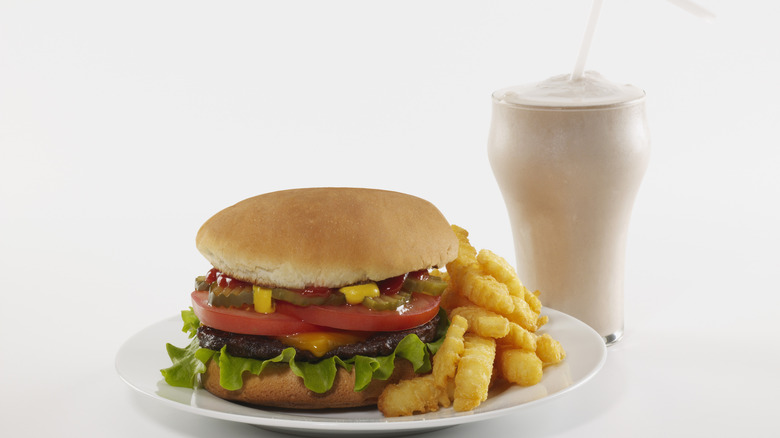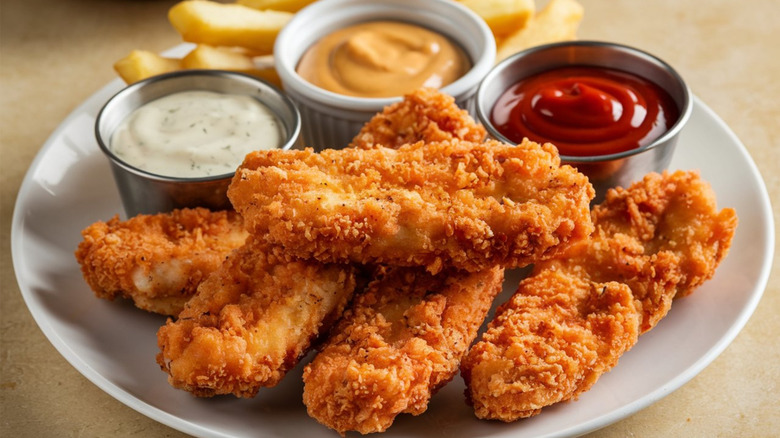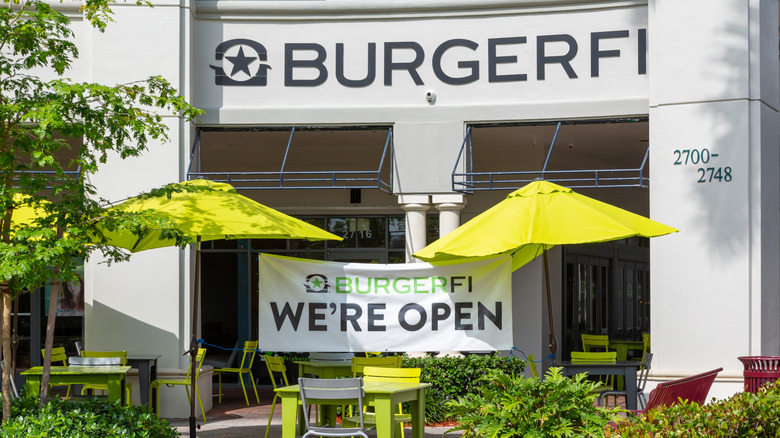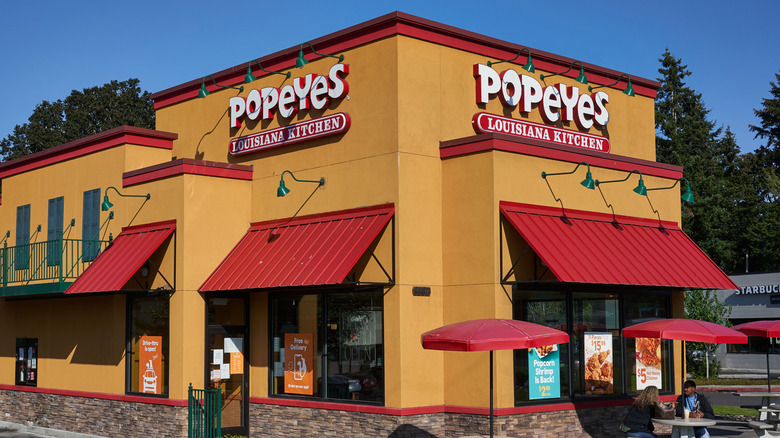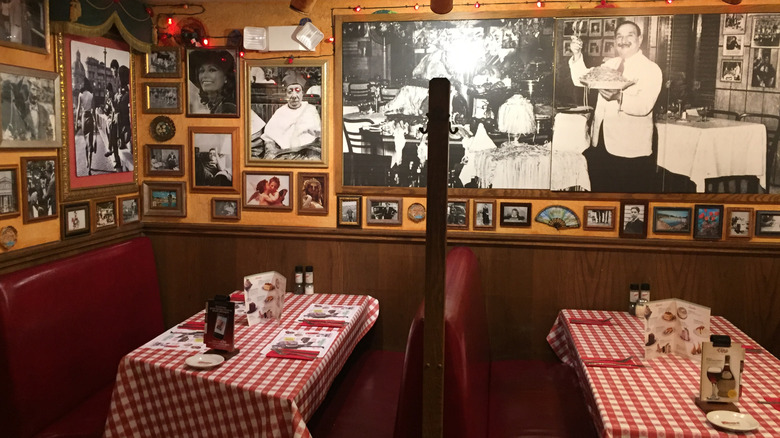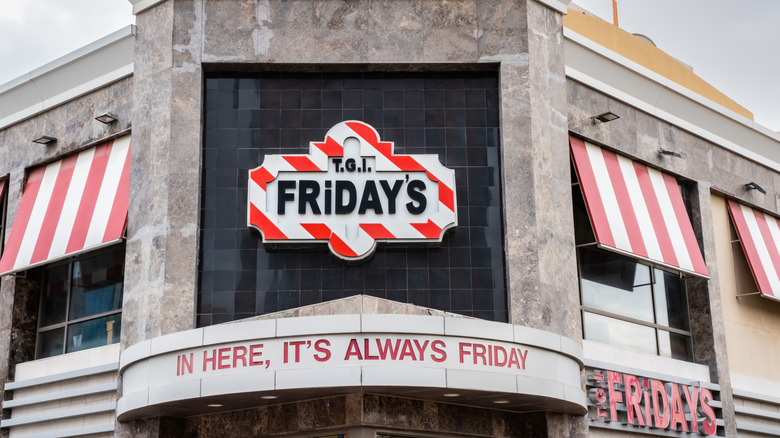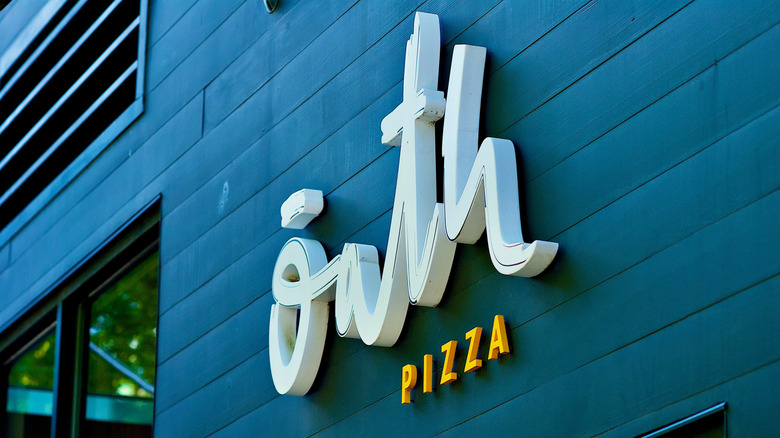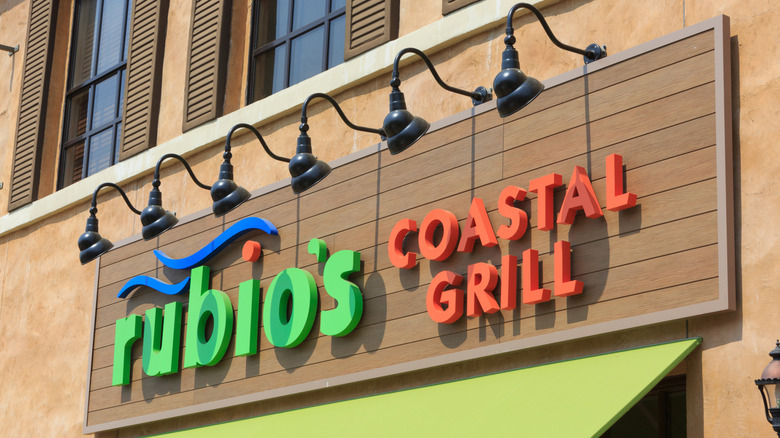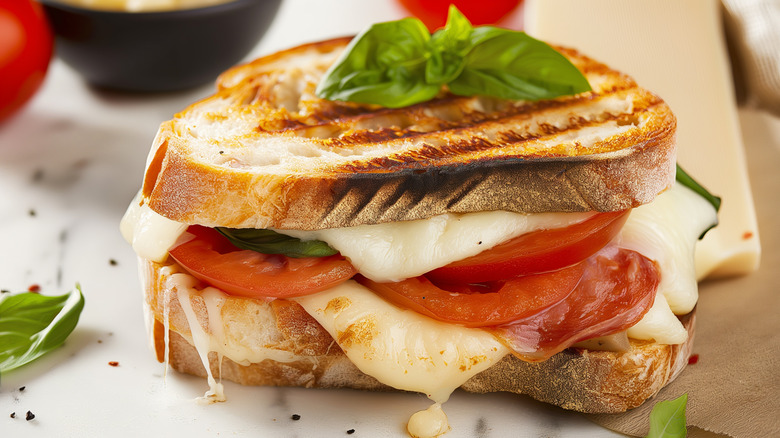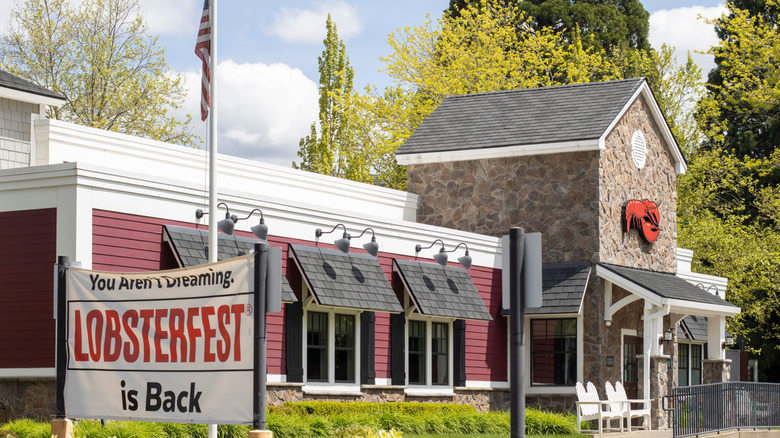14 Restaurant Chains That Filed For Bankruptcy In 2024
The notion that the vast majority of restaurants fail in their first year may be a debunked myth, but having an established brand with a local or national chain is no guarantee of success. Even for the best planners, a wide range of economic and societal factors beyond an owner's control set the conditions under which they find themselves thriving or surviving.
This is especially true for restaurant chains throughout 2024 as recovering from the trials of a once-in-a-century pandemic were compounded by the persisting impact of 40-year high inflation. On top of that, changing consumer trends found a considerable number of well-known brands heading to court to seek the protections of Chapter 11 bankruptcy. Less a death knell and more a warning bell, only some of the popular eateries choosing this route wound up closed for good. Others changed hands, and a few managed to come out on the other side with a positive outlook moving forward. Here's 14 restaurant chains that had to file bankruptcy in 2024.
Ill-timed expansion preempted pitfalls for one burger chain
Traditionally a time of celebration, New Year's Eve parties often mark another completed trip around the sun. In the case of Hwy 55 Burgers, Shakes & Fries, there was hardly a cause to pop champagne as its owner, The Little Mint Inc., filed for bankruptcy on December 31, 2024. Out of its 22 corporate-owned and 71 franchised locations across Alabama, Georgia, North Carolina, South Carolina and Tennessee, 13 of The Little Mint's owned restaurants were already closed when they proceeded to a North Carolina court.
Prior to the pandemic, Hwy 55 had attempted to kick off an expansion in 2018 that rapidly grew problematic with a failure to secure financial backing before restrictions began. On top of supply chain issues and increased costs, financial records indicated the chain operated at a loss through 2022 and 2023. While wage demands went up, menu prices necessarily remained stable due to the strain on consumers. At the same time, Hwy 55 had agreed to pay more than $11,000 in fines after the Department of Labor uncovered violations of child labor laws. Those penalties had stemmed from allowing minors to work past 7 p.m. on school nights and, in one instance, permitting a 15-year-old to operate a manual fryer despite the task being prohibited to employees under the age of 16.
Covid quashed a chicken finger concept
For those restaurants that managed to weather the pandemic, returning to business as usual was anything but — especially in densely populated cities like New York. Even as many eateries had erected outdoor dining rooms to add seating with improved ventilation and social distancing, customers remained slow to return. So it was for Sticky's Holdings, the owner of the chicken finger chain Sticky's, that faulted Covid for its financial struggles in an April 2024 bankruptcy filing.
Facing an increased demand for delivery of its combos, wraps, and sandwiches on top of the added burdens of the down economy, Sticky's — once Sticky's Finger Joint — had closed four of its 12 locations throughout New York and New Jersey. The chicken finger joint also faced financial burden from lawsuits that included a trademark infringement from the South Carolina-based barbecue chain Sticky Fingers over name similarities. Additionally, a $600,000 judgment was awarded to a former landlord after Sticky's Holdings' corporate offices had broken its lease and relocated.
Two chains were impacted by the same filing
What began as an effort for Fort Lauderdale, Florida's BurgerFi International, Inc. to stabilize its business, wound up leading to the sale of its corporate-owned locations. Following the September 2024 Chapter 11 bankruptcy of the parent company to BurgerFi and Anthony's Coal Fired Pizza & Wings, TREW Capital Management had stepped in to acquire the "next-level burger" business in November.
Prior to TREW's involvement with a combined $54 million to purchase the two chains out of bankruptcy, efforts to right the ship had included closing nearly 20 of BurgerFi's underperforming corporate-owned locations to better address increased costs and decreased consumer spending. Rather than specifics, bankruptcy filings allowed for disclosure within ranges for assets and liabilities. Though BurgerFi's food remained fast-casual, there was no quick solution to overcome the liabilities that fell between $100 million and $500 million against its $50 million to $75 million in assets. Ultimately, the Anthony's locations were sold to Burger King franchisee Kuljeet Singh while the 85 BurgerFi establishments were acquired by Detroit-based Savvy Sliders in December.
Three locations were the bane of one chicken franchise
From its three for $5 Signature Chicken deal to trendier promotions like the TikTok-famous, strictly side dishes "girl dinner," Popeyes was not lacking for delivering popular options to its customers "Louisiana fast." Unfortunately, the success of the brand wasn't enough to keep one franchisee's 17 locations from suffering as a result of three troublesome establishments. In order to save the remainder of its restaurants, RRG, Inc. filed bankruptcy at the end of January 2024 in the Southern District of Georgia.
Detailing that it had fallen behind on lease payments for its profitable locations, the Mark and Jane Rinna-owned RRG, Inc. made clear its intention to continue operations while undertaking the closure of the few restaurants that were weighing it down. Its liabilities fell between $1 million and $10 million whereas its assets were marked under $50,000. A similar scenario had unfolded a year prior when Popeyes franchisee, Premier Cajun Kings, LLC had filed bankruptcy in Alabama, closing 10 of its locations for the sake of the remaining restaurants and hundreds of employees throughout Alabama, Georgia, and Tennessee.
Family-style faltered for a popular chain
Social distancing became far more than a buzz term throughout the pandemic as common practices like handshakes and hugs were replaced for some with a new normal in fist bumps and polite waves. Subsequently, Buca di Beppo's Italian restaurants, that featured hearty portions served family-style, became less appealing for cautious customers in favor of single-serve options — even with a plethora of resources on proper sharing etiquette.
Of course, Covid conditioning was only one of the troubles for Buca as its August 2024 filing accounted for between $15 million and $50 million owed to at least 30 creditors. Prior to seeking the Chapter 11 protections, the Orlando, Florida-based company had closed more than a dozen of its establishments, leaving 44 in operation across roughly a third of the United States. Amid its effort to recover from the economic downturn and adapt to consumer trends, the Italian eatery had signaled optimism announcing it had begun the process of opening a new location.
Mediterranean cuisine survived via Edible Brands
Much like in the Big Apple, chain locations that rely on heavy foot traffic in downtown districts had taken a serious hit from the pandemic and beyond. So, with 17 locations throughout Chicago, Minneapolis, and Washington, D.C., Rōti Modern Mediterranean filed Chapter 11 bankruptcy in August 2024 with the stated intent of finding a new owner. By February 2025, it had secured a buyer in Edible Arrangements' parent company, Edible Brands.
Through the private equity firm BroadPeak Capital, Edible Arrangements' founder Tariq Farid acquired Rōti with a plan of shifting from a corporate-only structure to selling franchises. Farid's portfolio also picked up an online THC retailer in March. His CEO daughter Somia Farid Silber had expressed her objective to incorporate education of the products on the website ahead of a targeted summer opening of a physical store in Atlanta. Of Rōti, she considered "innovative food experiences" to be a "natural extension" of the plan for growth.
Bankruptcy for a ramen chain and burger joints spelled the end for one
Anyone who'd lives on a tight budget — even before inflation had spiked and Covid disrupted the world — could likely tell you their own preferred flavor of Maruchan ramen. Likewise, Portland, Oregon-area noodle fans had been able to get their fix at MMMco.'s four Boxer Ramen locations. At least that had been the case for 11 years until February 2024 bankruptcy had led to April closures. In addition to ramen, Boxer's Japanese fare had included bento boxes and potstickers for more than a decade until the economic downturn became too much to overcome.
The bankruptcy had also included MMMco's five SuperDeluxe burger restaurants which, before Nashville's Angelo Lombardi had become the debtor-in-possession, had decided to close its two locations that lacked the convenience of a drive-thru. However, all was not lost for restauranteur Micah Camden as MMMco.'s bankruptcy had not included its dessert brand Kinnamōns and its Baes Fried Chicken restaurants.
Casual dining faced continued closures
Born out of the founder's desire to have a spot where singles could meet, TGI Fridays had spent decades growing into the fabric of Americana. While the expression "Thank God It's Friday" for which it was named had endured, as of November 2024 the chain experienced anything but a happy hour. Once surpassing 600 establishments, Fridays had started 2024 with around 270 locations after closing 100 restaurants in 2023. Those closures had preempted another 30 following the fall bankruptcy filing that did not include franchise locations.
Economic strife for the chain had come well before the pandemic as the recession that followed the burst of the housing bubble during the aughts had kicked off an ongoing decline. Still, Fridays' filing was part of a plan to find a path for continued viability in the wake of corporate structure troubles. In the meantime, $5 Happy Hour remained and customers could enjoy Fridays' 60th anniversary selections like a twofer deal at $19.65 in honor of the year it originally opened.
A pizzeria chain's bankruptcy couldn't stave off its end
Expectations are often mixed for businesses that seek Chapter 11 bankruptcy as many might see a light at the end of their restructuring tunnel. The same could hardly be said for chains like Oath Pizza's parent company Next Level Pizza Inc. when Chapter 7 bankruptcy was filed in October 2024. The intention going in was to liquidate assets as a means to pay off creditors, and Next Level Pizza was certainly in need after it had already closed all of its company-owned locations. According to its filing, the company had somewhere between $100,000 and $500,000 in assets against anywhere from $10 million to $50 million in liabilities.
Whereas similarly struggling restaurants had to contend with the troublesome economy, the pizza chain also had to handle the fallout of a lawsuit against its former CEO Drew Kellogg who'd reportedly endeavored to fraudulently sell the company to himself after announcing insolvency. That suit was ultimately settled before the bankruptcy decision, but by then only three franchisees remained operating out of a chain that once had 17 locations.
Debt acquisition preempted one seafood spot's latest bankruptcy
The stateside history of Baja-style fish tacos could arguably be traced back to the '70s when San Diego chef Ralph Rubio took a trip to San Felipe, Mexico. Decades after acquiring the fried fish taco recipe from a local taqueria and opening his first restaurant out of which the chain Rubio's Coastal Grill was born, a May 2024 bankruptcy filing preempted a change of ownership.
Having previously filed bankruptcy in 2020 during the pandemic, Rubio's had struggled with sales in the following years leading it to close an increasing number of locations. By March 2024, TREW Capital Management had stepped in to acquire more than $72 million worth of debt from the seafood brand. Still, Rubio's wound up closing about 50 locations in California before the TREW affiliate The Original Fish Taco LLC swept in with an offer to buy the chain for $40 million in July. After closing a few more spots in the Golden State thereafter, the popular Mexican chain carried on under new ownership with 86 locations across Arizona, California, and Nevada.
Bankruptcy benefitted a lender in acquiring two brands
Depending on circumstance and strategy — and maybe even a bit of luck — bankruptcy can sometimes prove a fruitful way to set a company back on a path toward success. In the case of One Table Restaurant Brands' salad concept Tender Greens and its Mexican chain Tocaya that was true, just not solely for the parent company. By July 2024, One Table had moved forward with a decision to file bankruptcy faulting the pandemic for leaving them with liabilities in the range of $10 million to $50 million and less than $500,000 in assets.
Rather than seeking a means to restructure, One Table's bankruptcy was filed with sale in mind. By October 2024, the Los Angeles-based company had obtained its objective when the lender Breakwater Management LP's acquisition was approved by the court. Breakwater had been an investor in the brands since 2021 before the firm walked away with 22 Tender Greens' and nine Tocaya's. Those totals followed downsizing as the salad spot cut two locations and the Mexican chain shed six restaurants.
Surviving bankruptcy left a bar chain bullish
Taking a path toward restructuring, the Tampa, Florida-based World of Beer Bar & Kitchen had entered bankruptcy in August 2024. At the time, its assets and liabilities had both fallen into the $10 million to $50 million range as the company faulted increased rent costs and higher interest rates among their reasons to seek protection toward correction. Among the accomplishments of the bankruptcy, court documents indicated that World of Beer's debt payment to its lender Synovus Bank had been reduced from $28 million to $19 million.
Emerging on the other side of bankruptcy after roughly five months, World of Beer had already begun expansion efforts in line with a press release that described its outlook as "bullish on the future." After a December opening in Fort Worth, Texas brought its total number of locations to 30, the chain was eyeing Annapolis, Maryland for its next venue as part of a plan to open between four and five franchise locations per year over a five year span.
Grilled cheese chain's plan ended with complete closure
A chain didn't have to be everywhere to achieve national notoriety as Melt Bar & Grilled had proved over a nearly 20-year run in Ohio. From its founding in Lakewood in 2006, Matt Fish's gourmet grilled cheese eatery had peaked at 13 locations and garnered appearances on programs like the Food Network's "Diners, Drive-Ins & Dives" with Guy Fieri and the Travel Channel's "Man vs. Food."
With bold menu choices like "The Parmageddon" and "The Big Popper" that could fill their own list of top ingredients to add to a grilled cheese, Melt was known for loyal customers waiting upward of an hour or more to dig in to the comfort food delicacies. Despite Melt's reputation, economic struggles following Covid found Fish slowly shuttering restaurants until he was left focusing on the flagship with renovations and different menu options after filing bankruptcy in June 2024. His efforts to adapt to the change in consumer preferences came to an end when on New Year's Day 2025 the Lakewood location joined the others in permanent closure.
A tanking lobster brand received a fresh start
Each year for two decades, seafood lovers delighted in Red Lobster's endless shrimp promotion to sample the varied preparations or declare "challenge accepted" and see how many rounds they could go. That changed when Thai Union, a supplier and the restaurant's largest investor, pushed for the promotion to become a permanent menu option that led to $11 million in losses for the chain. That was only part of the problem for Red Lobster as it entered bankruptcy in May 2024 amid closures of more than 100 locations across the nation.
The protections of Chapter 11 bankruptcy allowed Red Lobster to address its mismanagement issues. As of September 2024, a judge had approved the purchase of the seafood chain by Fortress Investment Group LLC through its RL Investor Holdings LLC, allowing for the Lobster purveyor's emergence from bankruptcy. That same investor had previously acquired Alamo Drafthouse before selling it to Sony Pictures Entertainment. Fortress also laid claim to Krystal, Logan's Roadhouse, Old Chicago Pizza & Taproom, and Twisted Tenders.


